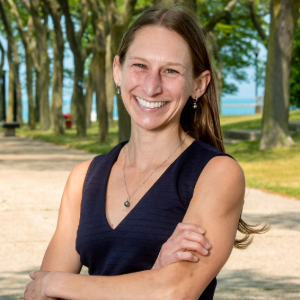
June 2024 Newsletter

June 2024 Newsletter

Faculty Profile
Courtney Blackwell, ’15 PhD, is an associate professor of Medical Social Sciences in the Divisions of Outcome and Measurement Science and Determinants of Health. Her research focuses on early childhood well-being and identifying social environmental factors that promote positive health and functioning across the lifespan.
She is also a co-Investigator for the Person Reported Outcome (PRO) Core for the NIH-funded Environmental influences on Child Health Outcomes (ECHO) research program, where she led the development of the Patient Reported Outcome Measurement Information System (PROMIS) early childhood parent-report measures for children ages 1-5 years, and is a co-investigator on the NIH Infant and Toddler Toolbox.
What are your research interests?
Broadly, my research is at the intersection of measurement science and child well-being. I am a developmental methodologist with mixed-methods expertise in the development, analysis, and validation of pediatric and parent-proxy PRO instruments using the state-of-the-science PROMIS methodology. A key feature of my methodological approach is emphasizing developmental sensitivity and lifespan coherence to enable assessment both within and across life stages. In addition to developing and modifying measures for use in pediatric populations, my work centers on identifying malleable factors to improve children’s well-being, with an emphasis on the role of social environmental risk and protective factors that influence well-being.
What is the ultimate goal of your research?
Ultimately, the goal of my research is to improve well-being of all children, regardless of illness or impairment status or social situation. Moreover, my research aims to shift the traditional medical paradigm of viewing “health” as the absence of disease to one that acknowledges – and assesses – the presence of well-being as a distinct, meaningful and measurable construct.
How did you become interested in this area of research?
One of the most interesting studies I read early on in grad school evaluated the role of high-quality kindergarten on long-term outcomes. The study found that kids in high-quality classrooms had better end-of-year test scores, but those effects quickly faded. However, when looking at longer term outcomes, the effect of high-quality classrooms reemerged as an important predictor of such outcomes as lifetime earnings, home ownership and educational attainment.
The scientists posited one reason may be that high-quality kindergarten classrooms fostered the development of foundational social-emotional skills that are important for successful functioning in adulthood. While “success” here was defined by objective outcomes, I thought there could also be a connection with subjective outcomes, where “success” is defined as being happy and satisfied with life and feeling a sense of purpose (i.e., well-being).
When I started at the Department of Medical Social Sciences as a co-PI on the ECHO study, I had the opportunity to be part of and eventually co-chair the Child Positive Health Working Group, which focused on well-being outcomes and provided me an opportunity to learn from the experts, as well as begin my own line of research focused on understanding whether there are early childhood positive health assets like those posited in the study on high-quality kindergarten that can influence both proximal (e.g., childhood and adolescence) and distal (adulthood) well-being.
One of the first steps was developing a set of new PROMIS measures to capture these constructs in young children, and with the continuation of the ECHO Study for another seven years, we have the unique opportunity to implement some of these measures and begin uncovering how these assets might lead to better well-being as well as the malleable factors that promote such assets early in life.
Where have you recently published papers?
Recent papers have been published in Pediatrics, the Journal of Pediatric Psychology, Psychological Assessment, Quality of Life Research and Academic Pediatrics.
What types of collaborations are you engaged in across campus (and beyond)?
As a team scientist, a primary focus of my work is engaging in transdisciplinary collaborations both at Northwestern as well as with colleagues across the country and world. Through my role as a faculty affiliate with the Northwestern Institute for Innovations in Developmental Sciences (DevSci), I have collaborated with colleagues in such areas as Communication Sciences and Disorders, Human Development and Social Policy, Psychology, Psychiatry and Behavioral Sciences and Pediatrics, in addition to colleagues in my own department of Medical Social Sciences. I often contribute my expertise in pediatric PRO measure development with projects ranging from a multi-year NIH contract to extend the NIH Toolbox to infants and toddlers to population health surveys evaluating the role of the COVID-19 pandemic on Chicago families to mentoring early-career physician-scientists on NIH K awards.
As part of ECHO, which is a large multi-site consortium of observational longitudinal pediatric cohorts, I work with investigators across the country on studies evaluating how a range of environmental exposures (e.g., social, biological, chemical/physical) impact child health outcomes. I have also collaborated with colleagues in Australia and Europe on a multi-country longitudinal study investigating the impact of the COVID-19 pandemic on early childhood mental and social health.